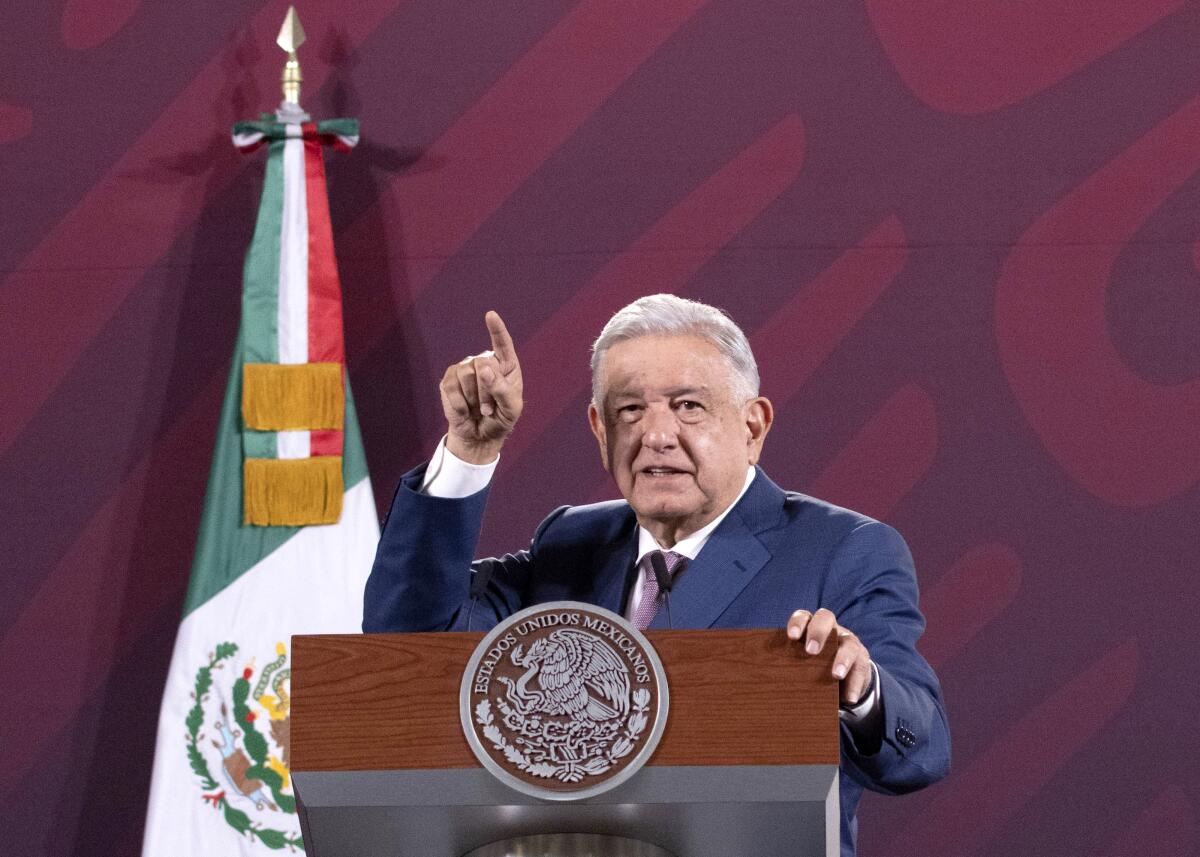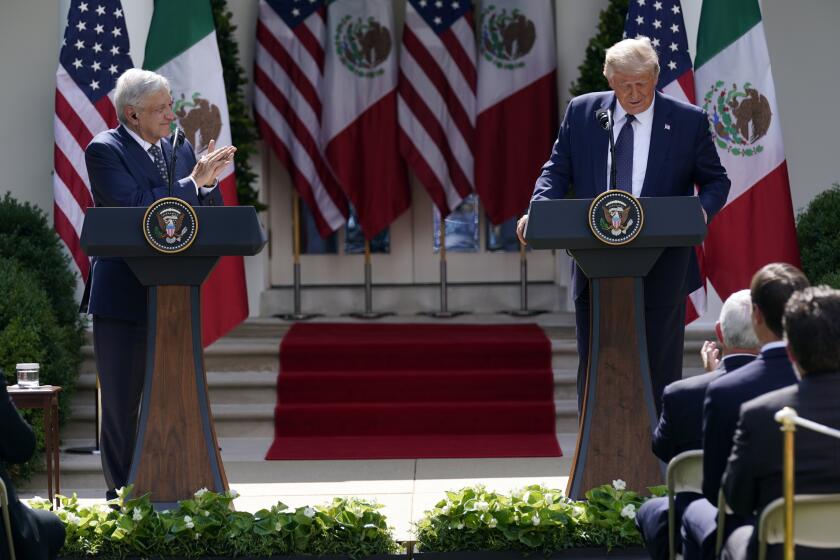Mexico’s transparency institute has revealed government corruption and wrongdoing. It’s now paralyzed

- Share via
MEXICO CITY — When Blanca Lilia Ibarra was a reporter in the 1980s, getting information on the workings of the Mexican government depended on whom you knew.
“That information is only given to national outlets,” a press secretary told her in response to questions about a new immigration law.
In the following years, journalists, activists and academics successfully lobbied for freedom-of-information laws and ultimately the creation of the National Institute for Transparency, Access to Information and Personal Data Protection.
Ibarra today leads the agency, which has helped shape the course of Mexico’s history, ordering officials to grant previously denied information requests that have allowed journalists and activists to uncover massive corruption schemes, locate clandestine graves and investigate large-scale infrastructure projects.
But now, the transparency institute is under threat.
Mexican President Andrés Manuel López Obrador argues that the independent agency — with a budget of $58 million and a staff of just over 800 — is too expensive and that “it would be better” if it didn’t exist.
“We don’t have anything to hide,” he said at a recent news conference. “Why do we need a bureaucratic apparatus?”
But critics charge that his attack is part of a broader attempt to weaken or eliminate institutions that serve as checks and balances on government power.
For Mexican President Andrés Manuel López Obrador, appearing to stand up to the United States has proved to have political benefits at home.
López Obrador recently tried to downsize the National Electoral Institute, an independent agency that helped Mexico transition from one-party rule more than two decades ago.
He has repeatedly accused Supreme Court judges of acting out of personal political interest — including when the body ruled this week that his transfer of the National Guard from civilian to military control was unconstitutional.

And last week, he announced he would shut down the government news agency Notimex, which had been locked in labor disputes.
He assured the public that “we have the mañanera,” as he calls his daily press briefings.
“The president has been very clear since the beginning that he doesn’t like other autonomous powers,” said Eduardo Bohórquez, executive director of the civil society monitoring group Mexican Transparency.
For the last three weeks, the transparency institute’s work has been halted because the president and his party have stalled the process of filling empty seats on the body’s seven-member commission. Left pending are more than 2,300 appeals of information requests that were denied or not adequately filled.
As the process to fill the seats has stalled, it has become a referendum on the institution’s very existence.
Last week the Mexican news outlet Latinus published a leaked audio of Interior Minister Adán Augusto López telling lawmakers that the president had said they were in an “ideal” situation and that there was “no urgency” to nominate new commissioners.
The right to information was enshrined in the Mexican Constitution in 1977, but for decades there was no infrastructure for Mexicans to enforce it.
In 2002, two years after the end of one-party rule, Mexico passed its first federal transparency law and created the agency that eventually became the INAI, as the transparency institute is known.
Since 2016, an online portal for information requests to government agencies has received more than 8 million submissions. During the most recent fiscal year, the INAI resolved more than 18,000 appeals.
The institute also protects citizens’ rights to access personal data, such as medical records, and sanctions private and public entities for stealing personal information.
In March 2022, the Senate began receiving applications from the public to fill two vacancies on the commission. The Senate, which is dominated by the president’s party, Morena, didn’t select the commissioners until last month, and only after an order from a federal judge.
López Obrador then vetoed the appointments, claiming that the candidates had been selected for political reasons.
After the vetoes, a commissioner retired at the end of March, leaving the INAI with four commissioners — one short of the quorum required to meet.
It’s unclear whether the Senate will vote again before its long summer recess begins on May 1.
Ricardo Monreal, the head of a Senate committee that decides which candidates to bring for a vote on the Senate floor, has said that senators from the president’s party have kept the vote from moving forward.
On Tuesday, Sen. Xóchitl Gálvez Ruiz from the opposition National Action Party hung a banner in the Senate with the words “What is Morena scared of?” and “#TransparencyNow.”
The INAI has petitioned the Supreme Court to order the Senate to nominate new commissioners, who must now be approved with a three-fifths majority, and to meanwhile allow the body to convene with four members.
In a meeting with The Times, three of the commissioners said that the INAI functions as a fundamental check on government power. It “empowers society to pressure government to be transparent, to pressure government to be accountable, and it allows society to partici-pate in public decisions,” said Ibarra, the president of the commission.

On Thursday, the Office of the United Nations High Commissioner for Human Rights sent a letter to the Senate urging it to appoint commissioners.
Mexican journalists have also called for an immediate resolution.
Jorge Carrasco, director of the Mexican news outlet Proceso, said that during President Felipe Calderón’s declared war on drug cartels, reporters frequently appealed to the INAI for data on civilians killed by armed forces, military deserters and judicial proceedings against the military for human rights violations.
More recently, he said, Proceso has appealed denials of requests for information on large-scale infrastructure projects under the control of the military, including the “Maya Train” that will traverse the Yucatan Peninsula, as well as the government’s use of the Israeli spyware known as Pegasus.
López Obrador has said that his administration would not turn over contracts for the software, despite an order from the INAI.
“There’s a desire to not be transparent,” said Carrasco.
The commissioners have emphasized their role in investigations that made headlines in Mexico, including a massive corruption scheme that found that federal government agencies had used public universities to divert hundreds of millions of dollars.
Journalists appealed to the INAI after their requests for records from government agencies were denied. The records helped show that many subcontracted companies were fake.
Without the INAI, “we would have had to consult hundreds of sources, to convince hundreds of public officials to give us the documents,” said Nayeli Roldán, a reporter at the news outlet Animal Politico. “And even with that we wouldn’t have gotten all the documents we wanted.”
More to Read
Sign up for Essential California
The most important California stories and recommendations in your inbox every morning.
You may occasionally receive promotional content from the Los Angeles Times.












